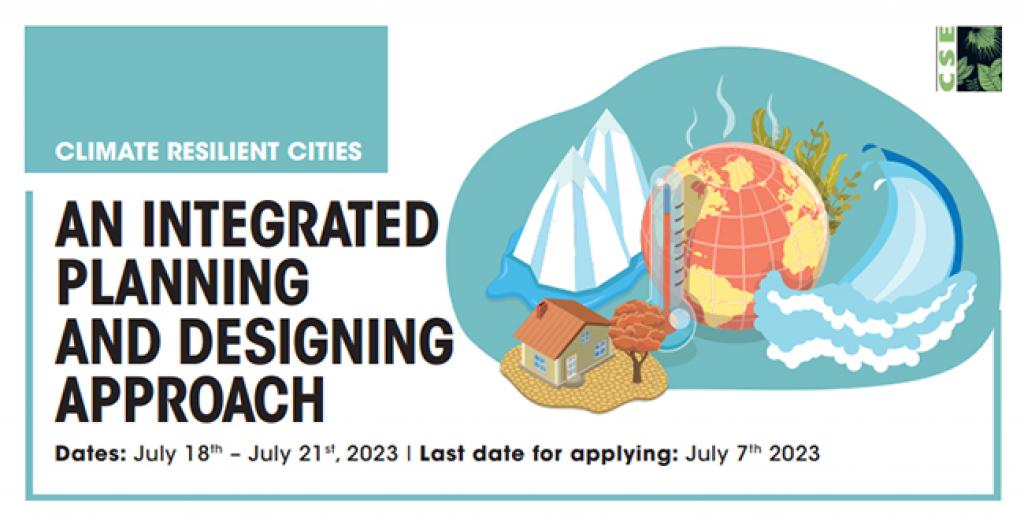Climate Resilient Cities: An integrated planning and designing approach: CSE

![]()
Last date to apply 7th July 23
Dates : July 18th – 21st July 2023
The Centre for Science and Environment (CSE) is a public interest research and advocacy organisation based in New Delhi. CSE researches into, lobbies for and communicates the urgency of development that is both sustainable and equitable. The scenario today demands using knowledge to bring about change. In other words, working India’s democracy. This is what we aim to do.The challenge, we see, is two-pronged. On the one hand, millions live within a biomass based subsistence economy, at the margins of survival. The environment is their only natural asset. But a degraded environment means stress on land, water and forest resources for survival. It means increasing destitution and poverty. Here, opportunity to bring about change is enormous.But it will need a commitment to reform – structural reform- in the way we do business with local communities. On the other hand, rapid industrialization is throwing up new problems: growing toxification and a costly disease burden. The answers will be in reinventing the growth model of the Western world for ourselves, so that we can leapfrog technology choices and find new ways of building wealth that will not cost us the earth. Our aim is to raise these concerns, participate in seeking answers and in pushing for answers, transforming these into policy and so practice. We do this through our research and by communicating our understanding through our publications.
Cities are at risk from climate change impacts on infrastructure, human lives, human health, environmental quality etc. According to one study, around 80 per cent of India’s population is highly vulnerable to extreme weather events. The impact of climate change ranges from increase in extreme weather events likeexcessive rainfall leading to floods to warmer temperatures leading to heat stress. India witnessed record breaking temperatures and heatwaves in 2022, Close to 280 heat wave days were recorded between March and May 2022 across 16 states. In the same year, Indian cities of Bengaluru, Delhi, Jodhpur Gurugram, Silchar etc. witnessed severe urban flooding due to excessive rainfall.These extreme weather events are set to become more frequent and the urban environment needs to brace for this impact.
The built sector has been a contributor to this and isestimated to be responsible for 32 per cent of the greenhouse gas emissions (covering both operational and embodied emissions), it als oconsumes over 1/3rd of energy consumption in the country. However, if planned and designed for resilience and mitigation, the built-sector can contribute solutions towards achieving India’s national goals such as reducing emission intensity of India’s GDP by 45 per cent below 2005 levelsby 2030as well as achieve net-zero emissions by 2070.
Anil Agarwal Environment Training Institute (AAETI) offers this course to provide the participant with a holistic knowledgefor designing of climate resilient and resource efficient built environments. This programme will capture how better layout planning, optimization of using green and blue infrastructure, building envelope design, choice of materials all play a part inimproving the thermal comfort in the built environment and overall well-being/liveability of its occupants.
The course will be held at AAETI which is an ECBC compliant sustainable, state of the art campus and acts as a learning tool for building design practices and understanding of sustainable building concepts. The campus has utilized various passive techniques such as decentralized systems (waste water, building waste, renewables, water sensitive design, etc.) which the participants will be made familiar with.
SALIENT FEATURES OF THE TRAINING COURSE:
- Cities and climate change: Policy levers and opportunities
- Understanding the drivers of heat gains, reductions, sources and sinks in an urban form
- Urban heat island effect
- Environmental safeguards and systems
- Potential of Remote Sensing (RS) and Geographic Information System (GIS) for urban climate studies
- State climate action plans
- Microclimate enhancement with green and blue infrastructure
- Layout planning to promote natural ventilation
- Resource prudent designing for circularity
- Building envelope and its components
- Materials and their properties of insulation, thermal mass etc.
- Energy conservation building codes
Course fees
Rs 28,000 (sponsorships and discounts available subject to satisfactory fulfilment of application form)
* Course fee includes tuition fee, external expert lecture sessions, training materials, Boarding and lodging, transport from New Delhi to AAETI and back.
Training Methodology
Classroom lectures, case studies, class exercises, discussions, and field visit.
Who can apply
Planners, Architects, Academicians, professionals from the building industry, Students pursuing architecture, planning and engineering, and anyone enthusiastic to learn about sustainable built environment.
Sugeet Grover
Programme Manager
Sustainable Habitat Programme, CSE
9818443366
sugeet.grover@cseindia.org
Course Director:
Rajneesh Sareen
Programme Director
Sustainable Habitat Programme, CSE
rajneesh.sareen@cseindia.org

